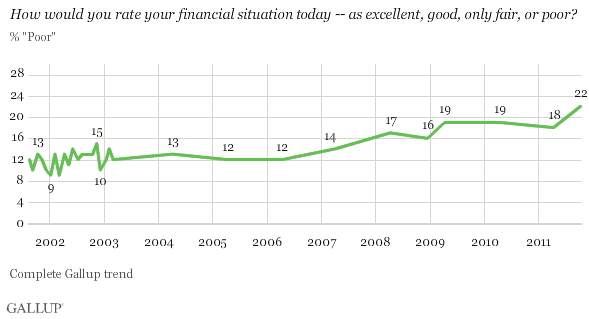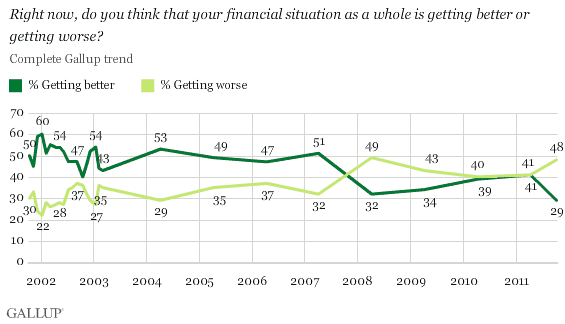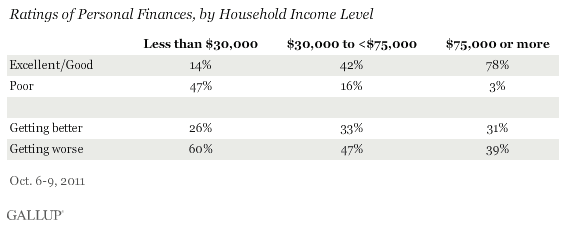WASHINGTON, D.C. -- Nearly one in four U.S. adults (22%) now rate their personal financial situation as "poor." This is up slightly from the 16% to 19% range seen during and after the official U.S. recession, and is the highest percentage since Gallup began asking this question in 2001.

Twice as many say their financial situation is either excellent (7%) or good (37%), but that is on the low end of what Gallup has measured. This question is asked each April as part of Gallup's Economy and Personal Finance survey, and has been asked periodically at other times since August 2001. The current results are based on an Oct. 6-9 Gallup poll.
Americans are also less hopeful about their future personal financial situations. Nearly half (48%) say their personal financial situation is "getting worse," up from 41% in April and nearly tying the record-high 49% who said so in April 2008. A new low of 29% say their personal financial situation is getting better.

Currently, 78% of those making $75,000 or more per year rate their situation as excellent or good, compared with 14% of those making less than $30,000 per year. This is a wider gap than was seen in April, when those percentages were 67% and 20%, respectively. At the same time, all income groups have become less likely to say their financial situation is getting better, and now 60% of the lowest income group says their personal financial situation is getting worse.

Variety of Financial Problems Trouble U.S. Families
When asked about the most important financial problem facing their family, similarly high numbers name lack of money/low wages (14%), too much debt (13%), high cost of living/inflation (13%), healthcare costs (12%), and unemployment/loss of job (10%). Lack of money/Low wages was the clear leader in July, and it has been either first or tied for first in every measurement since February 2009.
![What is the most important financial problem facing your family today? [OPEN-ENDED] October 2011 results](http://content.gallup.com/origin/gallupinc/GallupSpaces/Production/Cms/POLL/3p-w3fzk1uuz7ekswfpo8g.gif)
The percentage this month mentioning the cost of living or inflation is now 13%, the highest since a record-high of 18% mentioned it in July 2008, when gas prices were surging. Indeed, the U.S. Labor Department Wednesday reported the sharpest increase in consumer prices it has seen in three years.
![2005-2011 trend: What is the most important financial problem facing your family today? [OPEN-ENDED]](http://content.gallup.com/origin/gallupinc/GallupSpaces/Production/Cms/POLL/o23ciqqs4uowph1yo-7i7q.gif)
Implications
Similar to their lower ratings of U.S. economic conditions more broadly, Americans have grown more negative in recent months about their personal economic situations. The fact that they are now even more likely than they were during the recession to rate their economic situation as poor helps explain why 80% of Americans maintain that the U.S. economy remains in recession. Further, the 48% who say their situation is getting worse is now similar to the percentage who said so in the months just prior to the U.S. economic collapse, perhaps giving fodder to those who predict a double-dip recession. Higher levels of worry about inflation, and confirmation of such from the U.S. government, likely will only add to their concerns.
Americans are not nearly as negative about their personal financial situations as they are about the economy in general. The 22% who rate their personal financial situation as poor compares with 53% who said the same about the national economy in Gallup Daily tracking conducted during the same week. The 48% who said their personal financial situation is getting worse compares with 75% who said so about the national economy. This divide is fairly typical, as Gallup generally finds that Americans rate their own congressional representative better than Congress as a whole, local schools better than national schools, and so on.
Still, financial well-being is a critical component of overall well-being, and Americans' increased negativity about their finances may be leading some to cut back on basic necessities critical to a healthy and productive life. Additionally, these attitudes present a major hurdle to consumer spending, job creation, and the broader U.S. economic recovery.
Survey Methods
Results for this Gallup poll are based on telephone interviews conducted Oct. 6-9, 2011, with a random sample of 1,005 adults, aged 18 and older, living in all 50 U.S. states and the District of Columbia.
For results based on the total sample of national adults, one can say with 95% confidence that the maximum margin of sampling error is ±4 percentage points.
Interviews are conducted with respondents on landline telephones and cellular phones, with interviews conducted in Spanish for respondents who are primarily Spanish-speaking. Each sample includes a minimum quota of 400 cell phone respondents and 600 landline respondents per 1,000 national adults, with additional minimum quotas among landline respondents by region. Landline telephone numbers are chosen at random among listed telephone numbers. Cell phone numbers are selected using random-digit-dial methods. Landline respondents are chosen at random within each household on the basis of which member had the most recent birthday.
Samples are weighted by gender, age, race, Hispanic ethnicity, education, region, adults in the household, and phone status (cell phone only/landline only/both, cell phone mostly, and having an unlisted landline number). Demographic weighting targets are based on the March 2010 Current Population Survey figures for the aged 18 and older non-institutionalized population living in U.S. telephone households. All reported margins of sampling error include the computed design effects for weighting and sample design.
In addition to sampling error, question wording and practical difficulties in conducting surveys can introduce error or bias into the findings of public opinion polls.
View methodology, full question results, and trend data.
For more details on Gallup's polling methodology, visit www.gallup.com.
